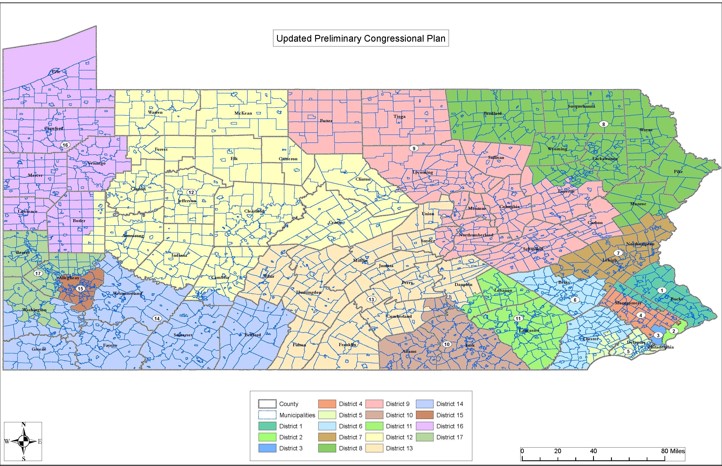With fewer than 60 days before the Feb. 15 deadline to enact new congressional district maps, efforts to conduct the process in a less partisan and more collegial manner hang by a thread.
Throughout the year, Republican leaders in both the state House and the Senate have promised transparency and public involvement, hoping to pass a map beyond dispute and that Democrat Gov. Tom Wolf would sign so that state courts don’t intrude on the process.
In July, Rep. Seth Grove (R-York), chairman of the House State Government Committee, announced what he called the “most transparent congressional redistricting in Pennsylvania history” through direct citizen involvement in the process. Sen. David Argall (R – Berks/ Schuylkill), chairman of the Senate State Government Committee, has similarly promised to “roll back the hyper-partisan gerrymandering sins of past decades” by “making this redistricting process much more open and transparent.”
However, Democrats have looked upon these comments with skepticism and are so far not impressed by the processes being used.
On Wednesday, an adjusted version of a map drawn by a Lehigh Valley piano teacher and redistricting advocate Amanda Holt was passed on a party-line vote by the House State Government Committee. Holt, a former Republican Lehigh County commissioner, was deeply involved in the state’s map-making a decade ago and led the charge for fairer, less gerrymandered maps.
“The only thing better than a citizen-drawn map is a citizen-drawn map that incorporates the feedback of citizens all across our commonwealth,” Grove said in a statement after the vote. “The minor adjustments made to the preliminary plan reflect changes that were important to Pennsylvanians.”
Yet, a leading Democrat on the committee threw cold water on the vote while foreshadowing arguments Democrats will likely make when a map comes to the full House floor for a final vote.
“We have an opportunity to use a citizen’s map as a vessel,” said Rep. Scott Conklin (D–Centre) in comments before the vote. “But today, what we’re about to do, is we’re going to throw the citizen’s map out and we’re going to amend it again with what the elected officials wanted.”
Grove noted during the committee meeting that the map was 95 percent similar to Holt’s and that changes were made to minimize splitting municipalities among a few other technical corrections.
In the Senate meanwhile, a draft version of a bipartisan map being drawn by Argall and Sen. Sharif Street (D–Philadelphia) has drawn heated feedback from Democrats.
The leaked draft would solidify Democratic U.S, Rep. Chrissy Houlahan’s district in the Philadelphia suburbs. However, it also appears to split Philadelphia into four districts rather than three, as it is now.
That move would take a northern portion of Democratic U.S, Rep. Brendan Boyle’s Philadelphia district and move it into Republican U.S. Rep. Brian Fitzpatrick’s district, which is comprised mostly of the Bucks County and a small slice of Montgomery County north of the city. The move would reduce the White population in Boyle’s current district, making a primary challenge from a Black politician, such as Street, more likely.
Democratic political consultant J.J. Balaban told The Philadelphia Inquirer, “Any Democratic elected official should be embarrassed to support a map as bad for Democrats as that map is.”
An anonymous national Democratic official who also spoke with The Inquirer went even further, “It’s clear the Republicans have never taken this process seriously and are just running out the clock — it’s time for the court to step in,” in a comment very similar to the claims made in a new lawsuit filed by “voters” with the help of the National Redistricting Action Fund, a group aligned with Democrats.
The unanimous Democratic opposition to the citizen’s map put forward by the house committee and the harsh Democratic criticism of the leaked Senate map show how fragile the desire for compromise is in Harrisburg.
Both chambers of the General Assembly and Wolf must come to a final agreement by Feb. 15 so that candidates hoping to be on the May 18th primary ballots can circulate nomination petitions on time.
As Holt testified, her map was “Based on census data and to not break precincts.
Although Wolf will need to approve the map the legislature puts forward or the map will end up being adjudicated by the courts, he has stated that he will not negotiate.
“No one should be surprised King Wolf doesn’t want to negotiate,” Grove said on Facebook.
State Rep. Andrew Lewis (R-Harrisburg) said, “We’ve got to move this process forward. We’re going to improve this map as we move forward.”
Follow us on social media: Twitter: @DV_Journal or Facebook.com/DelawareValleyJournal

